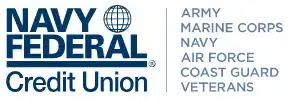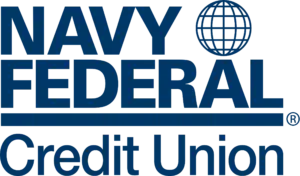You probably won’t be surprised to hear there are over 6,000 banks and another 6,000 credit unions in the United States. You can’t drive down the road without passing at least a dozen different banks.
If you’re looking for a new bank, it can be an overwhelming search. Each bank or credit union is going to offer different products, accounts, and rates.
If you’re like most people, you’re going to start your search at the large national banks, but you could be missing out on some of the best choices by not looking at the top credit unions. If you don’t have any credit unions on your list, you’re making a serious mistake.
This article is going to look at Navy Federal Credit Union (NFCU) and help you decide if they are the best financial institution for you.
Table of Contents
Who Is Navy Federal Credit Union?

Navy Federal Credit Union has some old roots. They were established way back in 1933 as the Navy Department Employees’ Credit Union of the District of Columbia (that’s a mouthful).
They were created as a credit union for Navy Employees who were members of the Federal Employee’s Union. A year later, in 1943, President Roosevelt signed the Federal Credit Union Act, which became the foundation for credit unions.
In 1947, Navy Department Employees’ Credit Union of the District of Columbia was dissolved and reestablished as an official federal credit union, which they named Navy Department Employees Federal Credit Union. At this point, they also opened up membership to all Navy employees and personnel in the Washington area.
In 1954, 21 years after their establishment, they officially became Navy Federal Credit Union. At this point, they opened their memberships to enlisted personnel. Through the years, they have continued to change and evolve. They have continued to grow and improve their products and services. They have become one of the largest and most influential credit unions on the market.
Today, they have over 7 million members across the country, and they have over $78 billion in assets.
Banking With NFCU
If you’re looking for a credit union with dozens of banking options, then NFCU is the best option for you. They have dozens of account options you can choose from. Each one is slightly different. I’m not going to outline all of the options, but I will hit some of the most popular ones.
e-Checking
The e-Checking account is one of the most popular accounts NFCU offers. This account has a monthly fee, but you can avoid it if you sign up for direct deposit. If you’re like most people, you’re going to be using direct deposit anyway.
These e-Checking accounts earn a modest dividend rate, and you can get rebates on ATM fees for up to $10 for every statement. As long as you don’t plan on walking into a physical branch, this is an excellent choice for you.
Flagship Checking
The Flagship Checking account is one of the premier accounts at NFCU. This plan has a tiered dividend system which is based on your account balance. The APY is going to be significantly higher with this account compared to the other accounts.
There is no minimum deposit to open the account, but you might have to pay a monthly fee. If your account balance is below $1,500, you won’t earn dividends. If your balance is more than the $1,500 threshold, you won’t have to pay any monthly fees. This is an excellent option for anyone who plans to hold a significant amount in their checking account and want to earn money based on the balance.
Campus Checking
As you can probably guess from the name, this account is designed for students to start saving. This account is available to any student between the ages of 14 – 24, and they won’t have to pay any service fees, and there is no minimum balance requirement.
It’s never too early to set your child up with a checking account. It’s the perfect way to teach them the importance of saving money and wise spending.
Free Active Duty Checking
Free Active Duty Checking comes with a decent APY and dividend rate, offering you advanced access to your military pay, rebates on ATM fees, and free customizable checks.
This checking account is an excellent choice for active-duty military in comparison with competitors, and the account comes with no monthly fees. It also comes with all the standard benefits of a Navy Federal checking account, like ATM access, a debit card, online banking, direct deposit, and mobile banking.
Free EveryDay Checking
Free EveryDay Checking is the most basic option for banking you can find at Navy Federal Credit Union. There is no monthly fee and no minimum balance requirement you’ll have to meet. If you want a straightforward checking account that won’t be sunk by fees, then this is an excellent option for you.
With this account, you will earn a modest 0.05% APY (currently), and you’ll have access to the same benefits of all the other accounts, like thousands of ATMs.
The basic savings account is exactly what it sounds like. It offers competitive interest rates with no fees. If you want a straightforward savings account, this is it.
Their SaveFirst is one of their more exciting savings accounts. This account lets you set a maturity date for the account, open the account with a $5 initial deposit, and then have dividends compounded daily.
NFCU Banking Account Options and Benefits
| Account Type | Monthly Fee & Requirements | Benefits | Ideal For |
|---|---|---|---|
| E-Checking | Avoidable With Direct Deposit | Modest Dividend Rate, ATM Fee Rebates | Those Not Visiting Branches |
| Flagship Checking | No Minimum Deposit, Fee Waived with $1,500+ Balance | Tiered Dividend System, Higher APY | Holding a Significant Balance |
| Campus Checking | Available for Ages 14-24, No Service Fees, No Minimum Balance | Ideal for Students, Teaching Savings | |
| Free Active Duty Checking | No Monthly Fees | Advanced Access to Military Pay, ATM Fee Rebates | Active-Duty Military, No Fees |
| Free EveryDay Checking | No Monthly Fee, No Minimum Balance | Modest 0.05% APY, Access to ATMs | Simple, Fee-Free Banking |
| Savings Accounts | Basic Savings: Competitive Rates, No Fees | Various Options for Savings | Different Savings Needs |
Navy Federal Credit Union Loan Specifics
Navy Federal Credit Union mortgage rates are a reflection of the institution’s identity. As a credit union devoted to working with military families, it is able to offer relatively low rates and provide a variety of mortgage options that require either zero or small minimum down payments.
Because Navy Federal is a credit union, you must pass through its entry requirements to become a member. In simplest terms, individuals who are members of the armed forces, veterans, civilian employees of the U.S. Department of Defense (including contractors), or family members of those in any of these groups are eligible. If you’re unsure if you qualify, Navy Federal provides an eligibility wizard to help you get started.
People who qualify to join Navy Federal Credit Union gain access to a variety of consumer-friendly loan types, including:
- Navy Federal Credit Union VA Loans: These mortgages are designed for eligible servicemembers, with terms ranging from 10 to 30 years. You don’t need a down payment to take advantage of a VA loan from Navy Federal, and interest rates can be as low as 4 percent. APRs can dip down to 4.53 percent.
- Navy Federal Credit Union Conventional Fixed Rate Loans: This fixed-rate mortgage comes with no PMI and offers both refinance and jumbo loan options. Navy Fed mortgage rates go as low as 4.25 for this loan, with APRs available down to 4.494 percent. This loan requires a 5 percent down payment on the home.
- Navy Federal Credit Union FHA Loans: Backed by the Federal Housing Administration, the FHA loan is designed for first-time homebuyers, featuring a 3.5 percent minimum down payment and configured as either a 10 to 30 year fixed loan or 30-year ARM loan. Mortgage rates are available for as low as 3.875 percent for this type of loan.
- Navy Federal Credit Union 100% Financing HomeBuyers Choice: Speaking of loans for first-time buyers, this mortgage requires no down payment, has interest rates as low as 5.25 percent and a fixed-rate structure that can be designed for a 10- to a 30-year term.
- Navy Federal Credit Union Adjustable-Rate Mortgage Loans: Adjustable-rate mortgages are popular among borrowers because they offer flexibility without refinancing. They’re structured with fixed rates for a certain period, after which rates can either raise or lower, according to the market. This mortgage features initial interest rates as low as 2.375 percent with APRs below 5 percent. You can get these loans set up in jumbo, conforming or interest-only configurations. This loan type is particularly good for homebuyers who may not remain in a home after the fixed period.
- Navy Federal Credit Union Interest Only Loans: These are available as fixed or adjustable-rate loans, but they require a 20 percent minimum down payment and 30-year terms. They can be a good fit whether you’re seeking a primary residence or a second home.
- Navy Federal Credit Union Military Choice Loans: With interest rates starting at 5.625 percent, APRs below 6 percent, no down payment required and no PMI, this loan is specifically designed to support the needs of military households. It comes with an easier qualification process and special rates.
Becoming a Member of NFCU
Every credit union has different membership requirements. For most of them, it’s if you “live, work, or worship” in the city or county limits of the credit union. For some of the larger credit unions, they have expanded their membership requirements and have made it more accessible. Of all of the credit unions, Navy Federal probably has the most ways you can be eligible to become a member, but they don’t let just anyone in.
Some of the ways you can qualify to become a member of NFCU are:
- Active Duty Military
- DoD Officer
- Veteran
- Be a Contractor to U.S. Government Installations
- Retired DoD Employee
- Or Be a Family Member of One of the Above
- A Part of the Delayed Entry Program
One of the interesting parts of NFCU is their family membership requirements. They offer more lenient requirements than most credit unions. Most of them limit it to “immediate family,” but NFCU expands on those. They allow:
- Grandparents
- Spouses
- Siblings
- Grandchildren
- Household Members
- Adopted Children and Stepchildren
Drawbacks of Navy Federal
There are a lot of benefits of becoming a member of NFCU. They great rates for their loans and their checking accounts. One of the problems with NFCU is their savings account. Their basic savings account only has a modest APY. Sure, it’s still higher than you’ll find with some of the major banks, but you can find credit unions with much better savings rates.
Another disadvantage of NFCU is the balance requirement to avoid fees on the Flagship checking. If you don’t meet the balance requirement, you’re going to pay the monthly fee.
There are dozens of other credit unions out there which offer high-yield checking accounts with no fees. As long as you plan to have the $1,500 in your account, there is nothing wrong with this account, but it’s something to be aware of.
Before you become a member of any credit union or join a bank, take the time to go through the customer reviews. One of the best ways to learn about a company is seeing what previous or current members have to say.
One common complaint I saw with NFCU is their customer service. Several users were saying they have problems reaching their customer service department or they weren’t able to get the help they needed. You should always take these reviews with a grain of salt. You don’t know the full story and what actually happened.
Like most other credit unions, we aware of the number of branches. Credit unions don’t have the massive number of branch locations like national banks.
Final Verdict on NFCU
Unlike some of the other credit, NFCU doesn’t have membership qualifications which allow anyone to join. Some of the other larger credit unions allow you to join organizations or make a donation which qualifies you to become a member of the credit union.
NFCU doesn’t do that. If you don’t have a family member in the armed forces or if you aren’t in the armed forces, then you probably won’t be able to be a member. If you do meet the qualifications to be a member, I would highly suggest doing so.
Every person is different, and everyone has different financial needs and preferences when it comes to banking. There are thousands of banking options on the market, and trying to wade through them can be difficult. It’s important you find the best one for you.
If NFCU is not the best option for you, don’t worry, there are plenty of other options.
How We Review Banking or Financial Institutions
Good Financial Cents undertakes a comprehensive review of banking and financial institutions, analyzing service offerings, customer satisfaction, and financial stability. Our intention is to provide readers with a balanced overview, aiding them in their financial journey. We consistently emphasize editorial transparency.
We source data from these institutions, reviewing account offerings and other key services. This data, when combined with our in-depth research, forms the foundation of our evaluation. Institutions are subsequently rated on a range of criteria, resulting in a star rating from one to five.
For further insight into the criteria we use to rate banking and financial institutions and our evaluation approach, please refer to our editorial guidelines and full disclaimer.
Navy Federal Credit Union Review

Product Name: Navy Federal Credit Union
Product Description: Navy Federal Credit Union is a leading financial institution exclusively serving the military community and their families. They provide a wide range of financial products, including savings and checking accounts, loans, credit cards, and investments, with a strong emphasis on competitive rates and 24/7 customer support.
Summary of Navy Federal Credit Union
Navy Federal Credit Union, with its roots dating back to 1933, has grown to become one of the largest credit unions in the United States, exclusively serving the military community. The institution provides a comprehensive suite of financial solutions, including various savings and checking account options tailored to different needs. Members can access affordable loans, credit cards with favorable terms, and even investment opportunities like certificates of deposit (CDs) and IRAs.
-
Cost and Fees
-
Customer Service
-
User Experience
-
Product Offerings
Overall
Pros
- Tailored to Military Members
- Diverse Financial Services
- Competitive Rates
- Exceptional Customer Support
- Convenient Digital Banking
Cons
- Limited Eligibility
- Smaller Branch Network
- Documentation Required
- Limited Overseas Access
- Minor Account Fees








Customer Service is atrocious once they get your business. Just refinanced a car loan with them and will be refinancing it with another lender as soon as I can. Will never do business with them again.
Interesting comments about NFCU customer service. I am a retired DOD civilian & been an NFCU member for over 35 years. When I was working I would go to the NFCU at our DOD facility. Now that I’m retired I call the toll free number. My experience has been very good with the telephone customer service representatives. Every one has answered my questions & helped me with using their mobile app. I have never heard this complaint from any of my friends who have retired & use the toll free service. Most of my friends moved to a location where there are no NFCUs within easy driving distance so they have no choice & have to rely on telephone contact. Just my 2 cents.
Don’t take the customer service as stated above “With a grain of salt”. That is how companies stay in business. It is still terrible and we have taken our money elsewhere.
There are some serious issues with the customer service at Navy Federal that extend beyond biased inferences or opinions about treatment. For example, they have no branch phone numbers. The phone number they list for every branch is for their general customer service line. If you e-message customer service, the policy for Navy Federal customer service is to provide no identification information regarding the person you are speaking to, not even an identification number. So, you do not know if you have ever requested help from that person before or had a poor experience with them. These are not common policies, I have never been with another banking institution that wanted to operate behind a veil from their customers to this degree. Good customer service comes from institutions that build their policies around putting their customers first, not around building defenses against the customers.